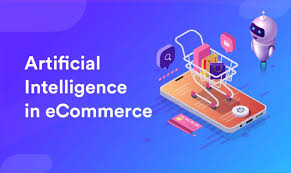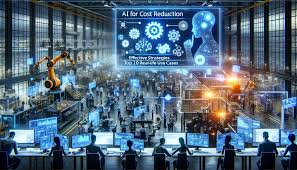
1. Personalized Shopping Experience
One of the most significant ways AI is revolutionizing the e-commerce industry is through personalization. AI algorithms analyze vast amounts of customer data—such as past purchases, browsing history, demographic information, and even social media activity—to create personalized shopping experiences. By doing so, e-commerce platforms can tailor product recommendations, content, and even marketing messages to individual users, leading to higher engagement and conversion rates.
For example:
- Recommendation Engines: Platforms like Amazon and Netflix use sophisticated recommendation algorithms to suggest products or services based on a customer’s previous behaviors. These suggestions are powered by machine learning algorithms that not only factor in a customer’s past purchases but also aggregate data from similar users to suggest items they are likely to be interested in.
- Dynamic Pricing: AI can help companies adjust prices dynamically based on market demand, competitor pricing, and customer behavior. For instance, if a customer repeatedly views a particular product, an AI system might offer them a discount or special promotion, encouraging them to make a purchase.
2. AI-Powered Chatbots and Virtual Assistants
AI-powered chatbots and virtual assistants have become a staple in modern e-commerce websites and mobile apps. These systems are designed to handle a variety of tasks—from answering frequently asked questions to helping users navigate through product catalogs and making purchase recommendations.
- 24/7 Customer Support: AI chatbots are available around the clock to assist customers, providing real-time responses to inquiries. This ensures that customers receive immediate help, no matter the time zone or their location.
- Enhanced Problem-Solving: More advanced AI-powered chatbots are capable of processing complex requests. For example, they can assist with order tracking, returns, exchanges, and even troubleshooting product issues—essentially acting as a personal shopping assistant that can guide customers through their entire journey.
Brands like Sephora and H&M have successfully integrated AI chatbots into their customer service processes, offering personalized beauty tips or styling advice to users based on their preferences.
3. Visual Search and AI-Driven Image Recognition
AI is also changing how customers find products online, thanks to visual search and image recognition technology. Instead of relying solely on keywords or text-based searches, users can now upload images of items they want to buy and let AI identify similar products available in online stores.
- Visual Search: AI-based visual search tools allow customers to upload pictures of clothing, accessories, or home decor, which are then analyzed by AI algorithms to find identical or similar items in the retailer's inventory. This can significantly improve the shopping experience by enabling customers to quickly find products that match their interests, even if they don’t know the exact name or brand.
- Augmented Reality (AR) Integration: AI-powered AR tools enable customers to try on products virtually before making a purchase. For instance, furniture retailers like IKEA use AI to allow customers to visualize how a piece of furniture would look in their home through their smartphone camera. Similarly, AI-driven beauty apps like L'Oréal use AR to let customers virtually try on makeup.
These features not only make shopping more enjoyable and engaging but also reduce the likelihood of returns by ensuring customers are more confident in their purchasing decisions.
4. Smart Inventory Management and Demand Forecasting
AI is also playing a critical role behind the scenes in inventory management, helping businesses to ensure they have the right products in stock at the right time. By analyzing historical sales data, seasonality trends, and external factors (like weather, holidays, and global events), AI can accurately forecast demand and optimize inventory levels.
- Demand Forecasting: E-commerce platforms can predict which products will be in demand, allowing them to stock up on popular items ahead of time. This reduces stockouts, ensures timely deliveries, and prevents overstocking, which can lead to unsold inventory.
- Automated Replenishment: AI can trigger automatic replenishment orders when stock levels drop below a certain threshold. This ensures that popular products never run out of stock, which is crucial for maintaining customer satisfaction.
By leveraging AI for inventory optimization, companies can reduce operational costs and provide customers with a smoother shopping experience, where products are readily available when needed.
5. AI-Driven Fraud Prevention and Security
As e-commerce continues to grow, so does the risk of fraud. AI has become a vital tool in enhancing security and protecting both businesses and customers from malicious activities. AI-powered systems can detect patterns of suspicious behavior, such as unusual login locations, multiple failed payment attempts, or the use of stolen credit cards, to identify and prevent fraud before it happens.
- Real-Time Transaction Monitoring: AI can continuously monitor transactions in real-time to flag suspicious activity. For example, if a customer typically makes small, local purchases but suddenly attempts a large international purchase, the AI system may flag this for review.
- Identity Verification: AI can also assist in verifying customer identities through facial recognition, fingerprint scanning, or other biometric methods, making the checkout process more secure.
By using AI for fraud detection, e-commerce businesses can protect themselves and their customers from the risks associated with online shopping, improving overall trust in their platform.
6. AI-Driven Marketing and Customer Engagement
Marketing plays a crucial role in the success of any e-commerce business, and AI is transforming how companies engage with customers. From automated email campaigns to hyper-targeted advertising, AI helps businesses craft highly personalized marketing strategies that resonate with their audience.
- Predictive Analytics: AI can analyze customer data to predict future buying behavior, enabling businesses to send personalized offers and product recommendations at the optimal time. For instance, if a customer abandons their shopping cart, AI-powered systems can trigger an automated reminder or offer a discount to encourage them to complete their purchase.
- Behavioral Targeting: With the help of machine learning algorithms, businesses can segment their customers based on factors like shopping habits, location, and preferences. This allows for more targeted marketing efforts that are far more likely to convert leads into loyal customers.
Companies like Netflix and Spotify have demonstrated the power of AI-driven content recommendations, and similar strategies are now being applied in the e-commerce space.
Conclusion
AI is no longer just a futuristic concept—it’s a present-day reality that is fundamentally reshaping the customer experience in e-commerce. From personalized shopping experiences and intelligent chatbots to smarter inventory management and enhanced security, AI is making online shopping more efficient, engaging, and customer-centric than ever before. As technology continues to evolve, we can expect AI to play an even greater role in shaping the future of e-commerce, ultimately creating a more seamless and enjoyable experience for customers worldwide.
For businesses, embracing AI isn't just a matter of staying competitive—it’s about anticipating customer needs and providing a next-level shopping experience that fosters loyalty and trust. The future of e-commerce is here, and AI is leading the charge.

